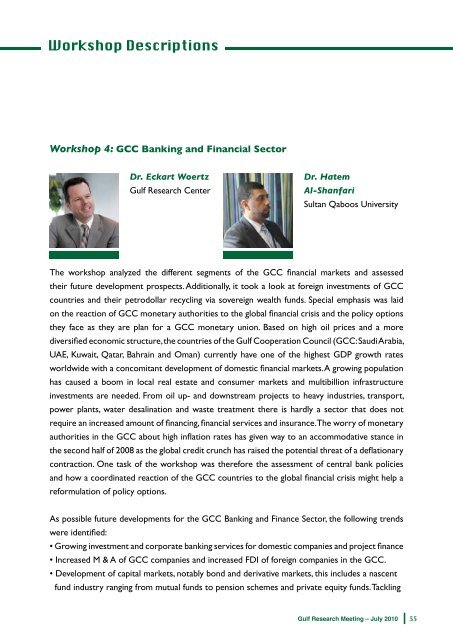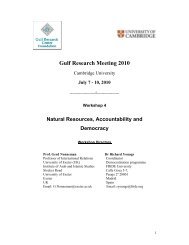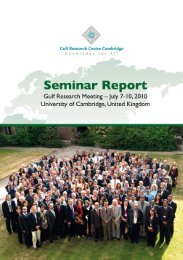GRM 2010 Report - Centre of Islamic Studies - University of ...
GRM 2010 Report - Centre of Islamic Studies - University of ...
GRM 2010 Report - Centre of Islamic Studies - University of ...
Create successful ePaper yourself
Turn your PDF publications into a flip-book with our unique Google optimized e-Paper software.
Workshop 4: GCC Banking and Financial Sector<br />
Dr. Eckart Woertz<br />
Gulf Research Center<br />
Dr. Hatem<br />
Al-Shanfari<br />
Sultan Qaboos <strong>University</strong><br />
The workshop analyzed the different segments <strong>of</strong> the GCC financial markets and assessed<br />
their future development prospects. Additionally, it took a look at foreign investments <strong>of</strong> GCC<br />
countries and their petrodollar recycling via sovereign wealth funds. Special emphasis was laid<br />
on the reaction <strong>of</strong> GCC monetary authorities to the global financial crisis and the policy options<br />
they face as they are plan for a GCC monetary union. Based on high oil prices and a more<br />
diversified economic structure, the countries <strong>of</strong> the Gulf Cooperation Council (GCC: Saudi Arabia,<br />
UAE, Kuwait, Qatar, Bahrain and Oman) currently have one <strong>of</strong> the highest GDP growth rates<br />
worldwide with a concomitant development <strong>of</strong> domestic financial markets. A growing population<br />
has caused a boom in local real estate and consumer markets and multibillion infrastructure<br />
investments are needed. From oil up- and downstream projects to heavy industries, transport,<br />
power plants, water desalination and waste treatment there is hardly a sector that does not<br />
require an increased amount <strong>of</strong> financing, financial services and insurance. The worry <strong>of</strong> monetary<br />
authorities in the GCC about high inflation rates has given way to an accommodative stance in<br />
the second half <strong>of</strong> 2008 as the global credit crunch has raised the potential threat <strong>of</strong> a deflationary<br />
contraction. One task <strong>of</strong> the workshop was therefore the assessment <strong>of</strong> central bank policies<br />
and how a coordinated reaction <strong>of</strong> the GCC countries to the global financial crisis might help a<br />
reformulation <strong>of</strong> policy options.<br />
As possible future developments for the GCC Banking and Finance Sector, the following trends<br />
were identified:<br />
• Growing investment and corporate banking services for domestic companies and project finance<br />
• Increased M & A <strong>of</strong> GCC companies and increased FDI <strong>of</strong> foreign companies in the GCC.<br />
• Development <strong>of</strong> capital markets, notably bond and derivative markets, this includes a nascent<br />
fund industry ranging from mutual funds to pension schemes and private equity funds. Tackling<br />
Gulf Research Meeting – July <strong>2010</strong> 55





